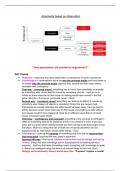Other
Arguments based on Observation OCR A* revision notes
- Institution
- OCR
Revision notes for year 1 OCR philosophy on the arguments on observation which are in depth explaining all of the AO1 and AO2 points with in an depth clear evaluation table with key philosophers for each AO2 question
[Show more]



